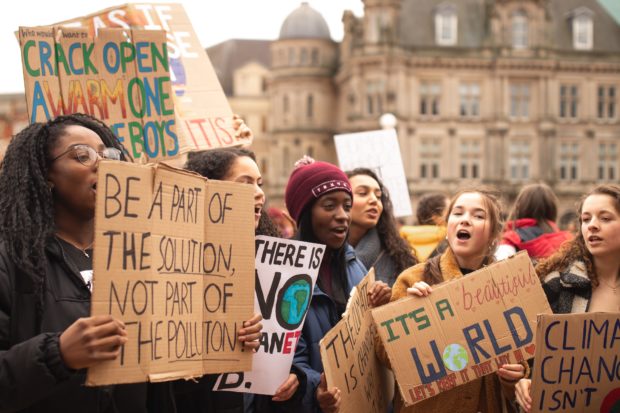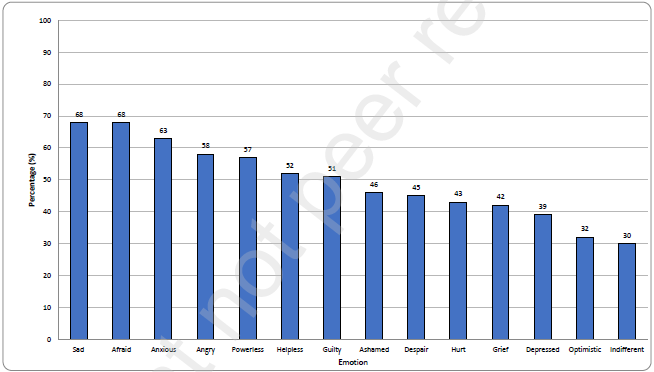‘Eco-anxiety’: PH children among most stressed by climate crisis
MANILA, Philippines—As the world lunges toward the point of no return in climate disaster, children in the Philippines and elsewhere in the world suffer from climate and ecological anxiety and distress.
A preprint study by The Lancet, a highly-respected peer review science and health journal, used the term eco-anxiety which it said was characterized by a wide range of painful and complex emotions like worry, fear, anger, grief, despair, guilt, shame, and hope linked to the climate crisis.
Events that cause eco-anxiety, the study said, included storms, wildfires, changing landscapes, and rising temperatures which are all linked to climate change.
“These experiences have been argued to be understandable, congruent, and healthy responses to the threats we face,” the study said.
“However, their intensity and complexity can be experienced as an unremitting psychological stressor,” it said.
Article continues after this advertisementIn another journal, Nature, which is also peer-reviewed, researcher Sarah Ray said the study “provides arguments for anyone who has any connection to youth mental health.”
Article continues after this advertisement“Climate change is a real dimension into their mental health problems,” Ray said.
Eco-anxiety among the youth
The Lancet study—the largest of its kind—surveyed 15,543 children aged 16-25 years old from 10 countries including the Philippines, United Kingdom (UK), Finland, France, United States (US), Australia, Portugal, Brazil, India, and Nigeria.
“These countries were chosen to reflect populations from the Global North and South, representing a range of cultures, incomes, climates, climate vulnerabilities, and exposure to differing intensities of climate-related events,” the study said.
The researchers analyzed responses from 10,000 participants, 51 percent of whom were male and 49 percent were female, who completed the survey.
The first series of questions included:
- Climate-related worry (level of worry about climate change).
- Climate-related functional impact (feelings about climate change negatively affecting functions).
- Climate-related emotions (presence of 14 positive and negative key emotions about climate change).
- Climate-related thoughts (presence of seven key negative thoughts about climate change).
Results showed that the majority of the respondents reported a significant amount of worry. Over 60 percent said it felt very worried (32 percent) or extremely worried (27 percent) about climate change.
At least 25 percent felt moderately worried, 11 percent were a little worried, while five percent said it was not worried about climate change.
The countries where most respondents felt “very worried” and “extremely worried” were from countries that suffer severe impacts of climate change including:
- Philippines: 84 percent (49 extremely worried, 35 very worried)
- India: 68 percent (35 extremely worried, 33 very worried)
- Brazil: 67 percent (29 extremely worried, 38 very worried)
Among high-income countries, Portugal—which has suffered intense wildfires—had the highest level of very worried and extremely worried respondents, or 65 percent.
Most of the respondents also associated negative emotions with climate crisis—including “sad,” “afraid,” “anxious,” and “powerless.”
Emotions associated with climate disasters were measured in percentages:
- Sad: 68 percent
- Afraid: 68 percent
- Anxious: 63 percent
- Angry: 59 percent
- Powerless: 57 percent
- Guilty: 51 percent
- Optimistic: 32 percent
- Indifferent: 20 percent
Over 45 percent meanwhile said feelings about climate change had a negative impact on their daily lives.
A high percentage of respondents likewise said it had negative thoughts due to climate change, like:
- People have failed to care for the planet: 83 percent
- Future is frightening: 75 percent
- Humanity is doomed: 56 percent
- Children have less opportunity than parents: 55 percent
- Most values will be destroyed: 55 percent
- Family security will be threatened: 52 percent
- Hesitant to have children: 39 percent
Dismissed voices
Unfortunately, concerns and opinions of the youth on climate change are often disregarded, according to study results.
Among those who said they talked with others about climate change—around 81.2 percent of the total respondents—almost half or 48.4 percent said other people had ignored or dismissed them.
“Results for thoughts and feelings about climate change varied significantly by country but were strikingly present in all populations,” the study said.
The researchers also found that respondents “tended to rate the government response negatively.”
More participants agreed on the negative statements about the government response including:
- Failing young people: 65 percent
- Lying about the impact of actions taken: 64 percent
- Dismissing peoples’ distress: 60 percent
- Betraying me or the future generations: 58 percent
While positive statements on the government response were only 30 percent:
- Acting in line with climate science: 36 percent
- Protecting me, planet, and future generations: 33 percent
- Can be trusted: 31 percent
- Doing enough to avoid catastrophe: 31 percent
- Taking concerns seriously enough: 30 percent
“The findings show that distress appears to be greater when people believe that government response is inadequate,” the researchers noted.
Respondents from the Philippines believed that the government lied about the impact of actions taken to address climate change (69 percent), failed the young (68 percent), betrayed future generations (56 percent), and have dismissed the youth’s call for action (53 percent).
Still, 52 percent said the government is acting in line with climate change.
“Distress about climate change is associated with young people perceiving that they have no future, that humanity is doomed, that governments are failing to respond adequately, and with feelings of betrayal and abandonment by governments and adults,” the study read.
“The failure of governments to adequately address climate change and the impact on younger generations potentially constitutes moral injury,” it said.
“Nations must respond to protect the mental health of children and young people by engaging in ethical, collective, policy-based action against climate change,” it added.
Why it matters
The study raises awareness on discussion about crucial impacts of climate change on the mental health and morality of children across the globe.
The researchers explained that the psychological burdens of climate change, paired with the moral injury caused by dismissive adults or governments, are chronic stress factors which will have “significant, long-lasting and incremental negative implications on the mental health of children and
young people.”
They also argued that negative emotions, or climate anxiety and eco-anxiety, felt by children toward climate crisis are important as it show the younger generation cares for the world.
“Climate anxiety may not constitute a mental illness, but the realities of climate change alongside governmental failures to act are chronic, long term and potentially inescapable stressors; conditions in which mental health problems will worsen,” the researchers said.
“Such high levels of distress, functional impact and feelings of betrayal will inevitably impact the mental health of children and young people,” they added.
The study also pushes adults and the government to take responsibility for eco-anxiety among youth.
“We argue that the failure of governments to adequately reduce, prevent, or mitigate climate change is contributing to psychological distress, moral injury and injustice,” the study said.
“Climate anxiety in children and young people should not be seen as simply caused by ecological disaster, it is also caused by more powerful ‘others’ (adults and governments) failing to act on the threats being faced,” it continued.
As one respondent told the researchers, “I don’t want to die. But I don’t want to live in a world that doesn’t care about children and animals.”



